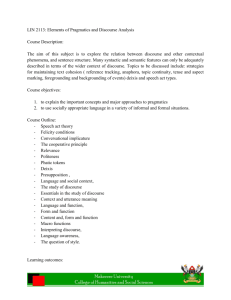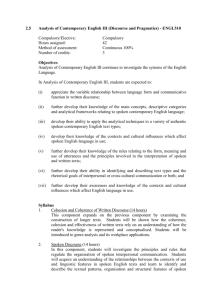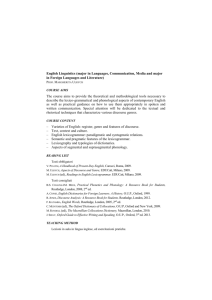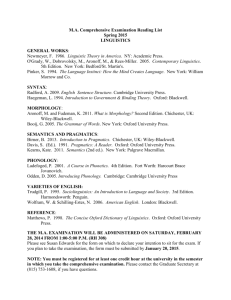ENGL519
advertisement
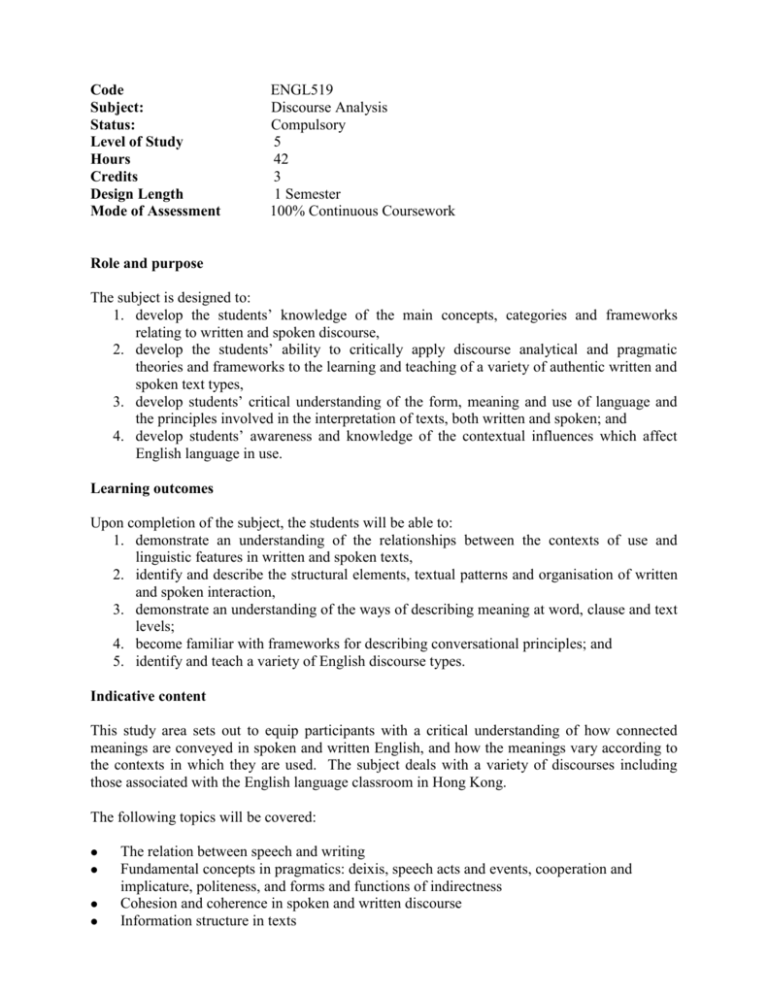
Code Subject: Status: Level of Study Hours Credits Design Length Mode of Assessment ENGL519 Discourse Analysis Compulsory 5 42 3 1 Semester 100% Continuous Coursework Role and purpose The subject is designed to: 1. develop the students’ knowledge of the main concepts, categories and frameworks relating to written and spoken discourse, 2. develop the students’ ability to critically apply discourse analytical and pragmatic theories and frameworks to the learning and teaching of a variety of authentic written and spoken text types, 3. develop students’ critical understanding of the form, meaning and use of language and the principles involved in the interpretation of texts, both written and spoken; and 4. develop students’ awareness and knowledge of the contextual influences which affect English language in use. Learning outcomes Upon completion of the subject, the students will be able to: 1. demonstrate an understanding of the relationships between the contexts of use and linguistic features in written and spoken texts, 2. identify and describe the structural elements, textual patterns and organisation of written and spoken interaction, 3. demonstrate an understanding of the ways of describing meaning at word, clause and text levels; 4. become familiar with frameworks for describing conversational principles; and 5. identify and teach a variety of English discourse types. Indicative content This study area sets out to equip participants with a critical understanding of how connected meanings are conveyed in spoken and written English, and how the meanings vary according to the contexts in which they are used. The subject deals with a variety of discourses including those associated with the English language classroom in Hong Kong. The following topics will be covered: The relation between speech and writing Fundamental concepts in pragmatics: deixis, speech acts and events, cooperation and implicature, politeness, and forms and functions of indirectness Cohesion and coherence in spoken and written discourse Information structure in texts Genre analysis: analysis of lexico-grammatical features, analysis of text-patterning, and structural interpretation of text-genre Analysis of classroom discourse for English language teachers Forms of learning and teaching This subject forms part of the language systems component of the programme. The study of phonetics and phonology, lexis, morphology and semantics, and grammar provide a theoretical and practical basis for the study of spoken and written discourse for English language teaching. Teaching and learning will take the form of lecture inputs followed by interactive seminars. Assessment Three written assignments (each 1,500 words and weighted equally). Reading Bhatia, V. K. 1993. Analysing Genre: Language Use in Professional Settings. London: Longman. Carter, R. and McCarthy, M. 1997. Exploring Spoken English. Cambridge: Cambridge University Press. Cheng, W. and Warren, M. 1999. Inexplicitness: what is it and should we be teaching it? Applied Linguistics Vol. 20/3, 293-315. Eggins, S. and Slade, D. 1997. Analysing Casual Conversation. London: Cassell. Grundy, P. 2000. Doing Pragmatics. Second edition. London: Arnold. Halliday, M. A. K. 1989. Spoken and Written Language. Oxford: Oxford University Press. Halliday, M. A. K. and Hasan, R. 1976. Cohesion in English. London: Longman. Hoey, M. 2001. Textual Interaction. Routledge: London. McCarthy, M. 1991. Discourse Analysis and Language Teaching. Cambridge: Cambridge University Press. Mey, J. 2001. Pragmatics: An Introduction. Second edition. Oxford: Blackwell. Sacks, H., Schegloff, E. A. and Jefferson, G. 1978. A simplest systematics for the organization of turn-taking in conversation. In J. Schenkein (ed.) Studies in the Organization of Conversational Interaction, 7-55. New York: Academic Press. Schegloff, E. A. and Sacks, H. 1974. Opening up closings. In R. Turner (ed.) Ethnomethodology: Selected Readings, 233-264. Baltimore: Penguin. Schiffrin, D. 1994. Approaches to Discourse Markers. Oxford: Basil Blackwell. Sinclair, J. McH. and Coulthard, R. M. 1975. Towards an Analysis of Discourse. Oxford: Oxford University Press. Stubbs, M. 1996. Text and Corpus Analysis. Oxford: Basil Blackwell. Swales, J. M. 1990. Genre Analysis. Cambridge: Cambridge University Press. Thomas, J. 199. Meaning in Interaction. London: Longman. Tsui, A.B.M. 1995. Introducing Classroom Interaction. London, New York: Penguin English. van Lier, L. 1996. Interaction in the Language Curriculum: Awareness, Autonomy and Authenticity. London: Longman. Yule, G. 1996. Pragmatics. Oxford: Oxford University Press. Prepared by: Martin Warren Date: 13 January 2005
